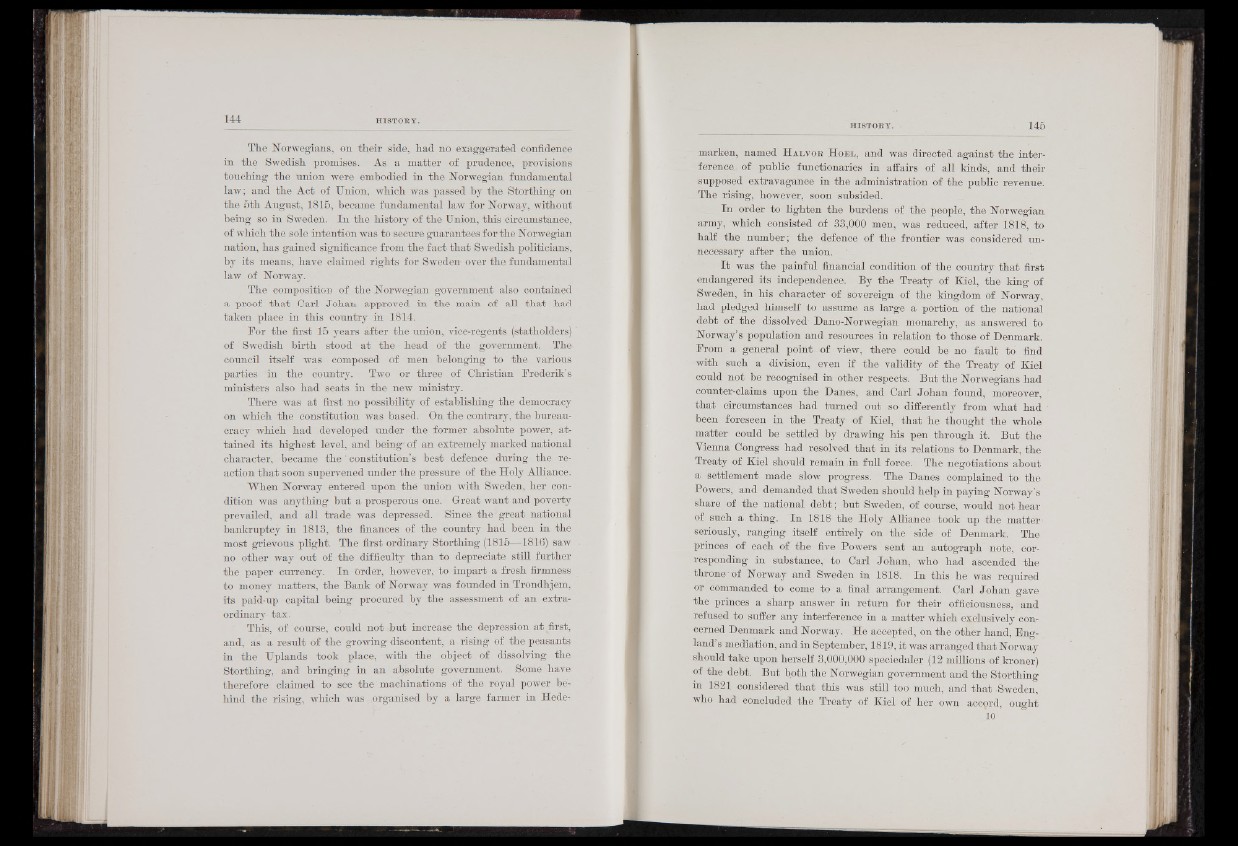
The Norwegians, on their side, had no exaggerated confidence
in the Swedish promises. As a matter of prudence, provisions
touching the union were embodied in the Norwegian fundamental
law; and the Act of Union, which was passed by the Storthing on
the 5th August, 1815, became fundamental law for Norway, without
being so in Sweden. In the history of the Union, this circumstance,
of which the sole intention was to secure guarantees for the Norwegian
nation, has gained significance from the fact that Swedish politicians,
by its means, have claimed rights for Sweden over the fundamental
law of Norway.
The composition of the Norwegian government also contained
a proof that Carl Johan approved in the main of all that had
taken place in this country in 1814.
For the first 15 years after the union, vice-regents (statholders)
of Swedish birth stood at the head of the government. The>
council itself was composed of men belonging to the various
parties in the country. Two or three of Christian Frederik’s
ministers also had seats in the new ministry.
There was at first no possibility of establishing the democracy
on which the constitution was based. On the contrary, the bureaucracy
which had developed under the former absolute power, attained
its highest level, and being' of an extremely marked national
character, became the ' constitution’s best defence during the -reaction
that soon supervened under the pressure of the Holy Alliance.
When Norway entered upon thé union with Sweden, her condition
was anything but a prosperous one. Great want and poverty
prevailed, and all trade was depressed. Since the great national
bankruptcy in 1813, the finances of the country had been in the
most grievous plight. The first ordinary Storthing (1815—1816) saw
no other way out of the difficulty than to depreciate still further
the paper currency. In Order, however, to impart a fresh firmness
to money matters, the Bank of Norway was founded in Trondhjem,
its paid-up capital being procured by the assessment of an extraordinary
tax.
This, of course, could not but increase the depression at first,
and, as a result of the growing discontent, a rising of the peasants
in the Uplands took place, with the object of dissolving the
Storthing, and bringing in an absolute government. Some have
therefore claimed to see the machinations of the royal power behind
the rising, which was organised by a large farmer in Hedemarken,
named Halvob Hoel, and was directed against the inter-
ferenca, of public functionaries in affairs of all kinds, and their
supposed extravagance in the administration of the public revenue.
The rising, however, soon subsided.
In order to lighten the burdens of the people, the Norwegian
army, which consisted of 33,000 men, was reduced, after 1818, to
half the number; the defence of the frontier was considered unnecessary
after the union.
I t was the painful financial condition of the country that first
endangered its independence. By the Treaiy of Kiel, the king of
Sweden, in his character of sovereign of the kingdom of Norway,
had pledged himself to assume as large a portion of the national
debt of the dissolved Dano-Norwegian monarchy, as answered to
Norway’s population and .resources in relation to those of Denmark.
From a general point of view, there could be no fault to find
with such a division, even if the validity of the Treaty of Kiel
could not be recognised in other respects. But the Norwegians had
counter-claims upon the Danes, and Carl Johan found, moreover,
that circumstances had turned out so differently from what had
been foreseen in the Treaiy of Kiel, that he thought the whole
matter could be settled by drawing his pen through it. But the
Vienna Congress had resolved that in its relations to Denmark, the
Treaty of Kiel should remain ,in full force. The negotiations about
a settlement made slow progress. The Danes. complained to the
Powers, and demanded that Sweden should help in paying Norway’s
share of the national debt; but Sweden, of course, would not hear
of such a thing. In 1818 the Holy Alliance took up the matter'
seriously, ranging itself entirely on the side of Denmark. The
princes of each of the five Powers sent an autograph note, corresponding
in substance, to Carl Johan, who had ascended the
throne of Norway and Sweden in 1818. In this he was required
or commanded to come to a final arrangement. Carl Johan gave
the princes a sharp answer in return for their officiousness, and
refused to suffer any interference in a matter which exclusively concerned
Denmark and Norway. He accepted, on the other hand, England’s
mediation, and in September, 1819, it was arranged that Norway
should take upon herself 3,000,000 speciedaler (12 millions of kroner)
of the debt. But both the Norwegian government and the Storthing
in 1821 considered that this was still too much, and that Sweden,
who had concluded the Treaty of Kiel of her own accord, ought
. 1 0 ’